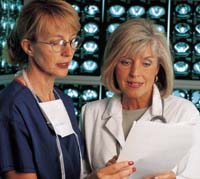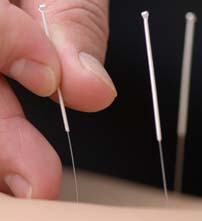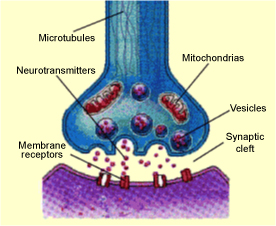Entries Tagged as 'Drug Addiction Alternative Treatment'
 The term addiction usually refers to the chronic use of one of three kinds of psychotropic substances, legal drugs (eg. alcohol, nicotine), illicit drugs (eg. cocaine, marijuana) or prescription drugs (eg. valium, prozac), in large enough quantities to cause life-damaging consequences in various aspects of one’s life.
The term addiction usually refers to the chronic use of one of three kinds of psychotropic substances, legal drugs (eg. alcohol, nicotine), illicit drugs (eg. cocaine, marijuana) or prescription drugs (eg. valium, prozac), in large enough quantities to cause life-damaging consequences in various aspects of one’s life.
Craving is the primary symptom of addiction, and if severe enough, an addict will destroy anyone or anything to get to the “substance” which they are deluded into believing will satisfy their craving and bring happiness.
Cause of Addiction
Biochemical imbalances in eight key neurotransmitters are the driving force behind all addictions. (Brain cells or neurons, produce chemical substances called neurotransmitters and they control virtually every aspect of your life by communication with other cells.) When they are deficient, the addicted person finds it extremely difficult to satisfy their cravings. Addicts become progressively powerless over the dictates of their imbalanced brain chemistry.
[Read more →]
Tags: Drug Addiction Alternative Treatment
 Recovery Assistants Foundation is a charitable organization that offers hope for recovery for those struggling with mental health conditions such as ADD, ADHD, depression, addictions, bi-polar, anxiety disorders and the results of childhood abuse.
Recovery Assistants Foundation is a charitable organization that offers hope for recovery for those struggling with mental health conditions such as ADD, ADHD, depression, addictions, bi-polar, anxiety disorders and the results of childhood abuse.
The Foundation provides support services and programs designed to treat the whole person, by addressing their needs in the areas of mental, physical, nutritional and spiritual wellness –a holistic approach to healing.
Healthy Minds For a Healthy Community – Impact on Lives
* Individuals are given the emotional, mental and financial support they need to balance brain chemistry.
* By receiving a clear diagnosis, behaviors improve and stigmas are replaced with knowledge.
* Clients learn to function in their lives – becoming more productive at work, home care, in dealing with debt/financial issues, and participation in life.
* Communication skills are improved allowing marriages and families to unite and relationships to heal.
* Children show positive change in behavior – self esteem and communication increases, grades improve, violence decreases, friendships and other relationships get better.
* Parents are prepared with resources to care for their child and empowered with knowledge of their child’s physical and emotional needs.
* Skills are learned to heal from abuse and develop boundaries.
* Leaders maintain integrity and passion for what they are called to do – gaining confidence to teach, disciple and lead with health and wholeness.
* Individuals have the resources to stay clean and sober from addictions.
* Goals that clients have set are achieved in every area of life from education and employment to spiritual walk and character development.
* Through counseling, support groups and other resources, clients become healthy and create positive change in their community.
[Read more →]
Tags: Drug Addiction Alternative Treatment
 Many people are unfamiliar with the term “Naturopathy.” The definition is presented here as recorded by Congress in 1931 in The Federal Dictionary of Occupational Titles, Section 079.101-014, “Naturopathic Physician.” This definition is based on a law passed by Congress in 1929 and signed into law by President Coolidge and is still in effect today. This law recognizes Naturopathy as an independent and non-medical healing art.
Many people are unfamiliar with the term “Naturopathy.” The definition is presented here as recorded by Congress in 1931 in The Federal Dictionary of Occupational Titles, Section 079.101-014, “Naturopathic Physician.” This definition is based on a law passed by Congress in 1929 and signed into law by President Coolidge and is still in effect today. This law recognizes Naturopathy as an independent and non-medical healing art.
“Diagnoses, treats and cares for patients, using a system of practice that bases treatment on physiological functions and abnormal conditions on natural laws governing the human body: Utilizes physiological, psychological and mechanical methods, such as air, water, light, heat, earth, phototherapy, food and herb therapy, psychotherapy, electrotherapy, naturopathic corrections and manipulation, and natural methods or modalities, together with natural medicines, natural processed foods, and herbs and nature’s remedies. Excludes major surgery, therapeutic use of x-ray and radium, and the use of drugs, except those assimilable substances containing elements or compounds which are components of body tissues and are physiologically compatible to body processes for maintenance of life.”
[Read more →]
Tags: Drug Addiction Alternative Treatment
 It is possible to overcome drug addictions but you will probably have to look outside the box of “conventional” addiction treatment programs to find the answer. Standard treatment programs often don’t take into account the “physiological basis” of drug abuse, an oversight some see as the main reason for their low success rates.
It is possible to overcome drug addictions but you will probably have to look outside the box of “conventional” addiction treatment programs to find the answer. Standard treatment programs often don’t take into account the “physiological basis” of drug abuse, an oversight some see as the main reason for their low success rates.
Although it isn’t logical to enter a program where the success rate is low, people have been doing so for years. Part of the reason may be that most people don’t realize that alternatives exist – viable alternatives with excellent success rates using the holistic medicine approach.
Dr. Joan Mathews-Larson, one of the pioneers in the holistic treatment of alcohol addiction, stated: “the conventional treatment system is antiquated because it isn’t based on science. It’s based on someone’s notion that there is some psychological flaw in alcoholics and that if we talk to them long enough, we’ll straighten them out”.
The following graph was adapted from Dr. Joan Mathews-Larson’s book, “Seven Weeks to Sobriety”. Dr. Larson was the first to show that the Orthomolecular Medicine approach, when added to a conventional psychosocial treatment model, could double and even triple the expected long-term recovery rates for alcohol and drug addicted people.
[Read more →]
Tags: Drug Addiction Alternative Treatment
September 25th, 2008 · No Comments
 The word “chiropractic” gets its’ name from the Greek words chiros and praktikos which means “done by hand”. Chiropractors diagnose and treat the misalignment of the spine and the resulting mechanical disorders that affect the nervous system and hinder good health.
The word “chiropractic” gets its’ name from the Greek words chiros and praktikos which means “done by hand”. Chiropractors diagnose and treat the misalignment of the spine and the resulting mechanical disorders that affect the nervous system and hinder good health.
In 1895, Daniel David Palmer (Father of Chiropractic) asserted that 95% of all health problems could be treated, or even prevented with spinal adjustments. This statement is based on his theory that misaligned vertebrae (subluxations) impede the function of the nervous system thus contributing to a wide variety of health issues.
Chiropractors locate these subluxations and, through gentle adjustments, restore the body’s normal functions. With the vertebra in place, the nerve passages open and regulatory impulses are free to pass allowing the body’s nervous system to heal itself. This method goes directly to the root of the problem. It does not mask symptoms like addictive prescription drugs often do.
A large-scale human study, dealing specifically with the area of drug addictions, affirmed the validity and effectiveness of chiropractic adjustments. Conducted by Dr. Jay Holder with the University of Miami School of Medicine and the Florida Chiropractic Society, the study showed dramatic results. The 18-month project demonstrated that those patients receiving these special treatments saw an almost 100% retention rate. The rate of retention, or how long a person stays in treatment, is vital because completion of a well-established and supported program assures a high success rate.
The “torque release technique”, developed by Dr. Holder, treats addiction by removing the subluxations band realigning the vertebrae. This, Dr. Holder asserts, “removes the interference with the normal functioning of the nervous system.” When the spine is misaligned, it interrupts the sequence of chemical changes necessary to maintain health and well-being. When the natural flow is interrupted, it results in what Dr. Holder calls “reward deficiency syndrome” and the body seeks the feeling of well being elsewhere.
[Read more →]
Tags: Drug Addiction Alternative Treatment
 Many alternative treatments for addictions have shown great promise including two related Traditional Chinese Methods (TCM), acupuncture and auriculotherapy (ear acupuncture). These two treatments have been used for centuries to maintain and restore health. More recently they have been used to treat modern drug addictions like cocaine, heroin, and crack as well as alcohol and cigarettes. Patients treated with this method often experience fewer relapses with no known negative side effects.
Many alternative treatments for addictions have shown great promise including two related Traditional Chinese Methods (TCM), acupuncture and auriculotherapy (ear acupuncture). These two treatments have been used for centuries to maintain and restore health. More recently they have been used to treat modern drug addictions like cocaine, heroin, and crack as well as alcohol and cigarettes. Patients treated with this method often experience fewer relapses with no known negative side effects.
It is interesting that we, in the Western World, think of Traditional Chinese Medicine as “alternative health” when it has been around for thousands of years!
Acupuncture
This procedure originated in China over 5000 years ago. It is based on the belief that health is determined by a life energy flow referred to as chi. According to this theory, energy flow circulates along 12 pathways called meridians, each linked to specific organs. Over 1000 acupoints within the meridian system can be stimulated to enhance the chi. During a treatment, special needles are inserted into these acupoints, which are located under the skin, to help correct any imbalance and restore health.
The Western World was largely unaware of acupuncture until the 1970s. In 1997 the National Institutes of Health (NIH) released a statement endorsing it for a variety of conditions. The World Health Organization has listed over 40 health conditions that acupuncture can improve including addictions.
Auriculotherapy
[Read more →]
Tags: Drug Addiction Alternative Treatment
 Herbal medicines can be part of a vital and successful strategy to combat addictions. They can be used to calm nerves, fight depression, detoxify, and help restore damaged organs and encourage healthy life choices.
Herbal medicines can be part of a vital and successful strategy to combat addictions. They can be used to calm nerves, fight depression, detoxify, and help restore damaged organs and encourage healthy life choices.
Here are some examples:
* Milk Thistle – Especially helpful in the support of the liver, helping to cleanse toxins and encourages new cell growth.
* Lobelia – helps reduce craving for nicotine
* Oatstraw – Helps to rebalance the levels of endorphins.
* St. Johns Wort – For use as an anti-depressant.
* Valerian – Acts as a good sedative and helps relax the central nervous system and decrease levels of anxiety and stress
[Read more →]
Tags: Drug Addiction Alternative Treatment
 Psychotherapy is an important tool in the struggle to overcome drug abuse. Various forms of psychotherapy have been employed to help individuals understand the past and learn problem solving strategies for dealing with many of life’s pressing problems.
Psychotherapy is an important tool in the struggle to overcome drug abuse. Various forms of psychotherapy have been employed to help individuals understand the past and learn problem solving strategies for dealing with many of life’s pressing problems.
Psychotherapy is known by different names such as therapy, talk therapy, counseling, and psychosocial therapy. Psychotherapy is an important part of a comprehensive drug treatment program and any program you enter should include individual as well as group counseling sessions.
Psychotherapy can help in many ways. Some of these include:
* Discovering effective coping techniques and new possibilities for solving problems. Many substance abusers report using drugs to help them cope with life. Discovering alternative ways of dealing with the ups and downs of life is vital to lasting recovery.
* Understanding some of the reasons for abusing substances.
* Learning to identify and change behaviors and/or thoughts that can adversely affect your life.
* Exploring important relationships and experiences and learning how they may be helping or hindering your recovery.
* Learning to set and reach realistic goals. Understanding how to think in terms of goals is an effective strategy in overcoming depression.
Psychotherapy is important in alleviating symptoms of mental illness that may be underlying factors in substance abuse. Therapy may be short-term or long-term, depending on the individual situation. Psychotherapy sessions can be conducted in group, family or individual therapy settings.
[Read more →]
Tags: Drug Addiction Alternative Treatment
 Amino-acid Therapy is a powerful natural means of healing and repair from drug abuse. This approach offers a highly effective alternative to standard addiction therapies.
Amino-acid Therapy is a powerful natural means of healing and repair from drug abuse. This approach offers a highly effective alternative to standard addiction therapies.
It is generally accepted that 20 amino acids are important to human nutrition for adults. They are the chemical units or “building blocks” of the body that make up proteins. They are all crucial to our health for repairing the body, promoting proper functioning of the blood, and enhancing communication within the brain and nervous system.
Amino acids are divided into two groups: essential and non-essential. Both types of amino acids are necessary for human functioning. The difference between the two groups is that essential amino acids are not synthesized by our bodies so it’s essential that we get them from another source. Because amino acids are not stored in the body like fats or carbohydrates, we have to consume them on a regular basis to maintain normal physical and mental health.
[Read more →]
Tags: Drug Addiction Alternative Treatment
 The term “drug addiction” is a disturbing word that brings to mind other words with equally unpleasant associations such as hopeless, out-of-control, desperate, inadequate, failure—you can no doubt add many more. Part of the reason the word is so upsetting is that for most people who try to overcome drug addiction, treatment options have been limited and often ineffective.
The term “drug addiction” is a disturbing word that brings to mind other words with equally unpleasant associations such as hopeless, out-of-control, desperate, inadequate, failure—you can no doubt add many more. Part of the reason the word is so upsetting is that for most people who try to overcome drug addiction, treatment options have been limited and often ineffective.
In fact, “conventional” drug addiction treatment programs have a success rate of 25% or less! One of the reasons I believe this to be the case is that these “conventional” programs do not adequately address the physiological basis of substance abuse; more specifically biochemical imbalances that occur in the brains of people with substance abuse issues. The good news is that solutions exist that do address these imbalances and offer hope to those seeking a more permanent solution.
According to Dr. C.E. Gant, author of “End Your Addiction Now”, “substance abuse problems are the result of biochemical imbalances that disrupt the normal workings of brain cells”. These imbalances are particularly important in the biochemistry of brain cells, or neurons. Neurons produce chemical substances called neurotransmitters (the brain’s messengers), and they control virtually every aspect of your life by communication with other cells.
Four key groups of “brain messengers” are related specifically to substance abuse. These particular messengers are vital to our ability to experience pleasure and satisfaction. The healthy functioning of these neurotransmitters is vital to our well-being and our ability to function in a productive manner. The four groups of neurotransmitters include endorphins and enkephalins, serotonin, GABA, and catacholamines.
[Read more →]
Tags: Drug Addiction Alternative Treatment
 The term addiction usually refers to the chronic use of one of three kinds of psychotropic substances, legal drugs (eg. alcohol, nicotine), illicit drugs (eg. cocaine, marijuana) or prescription drugs (eg. valium, prozac), in large enough quantities to cause life-damaging consequences in various aspects of one’s life.
The term addiction usually refers to the chronic use of one of three kinds of psychotropic substances, legal drugs (eg. alcohol, nicotine), illicit drugs (eg. cocaine, marijuana) or prescription drugs (eg. valium, prozac), in large enough quantities to cause life-damaging consequences in various aspects of one’s life.  Recovery Assistants Foundation is a charitable organization that offers hope for recovery for those struggling with mental health conditions such as ADD, ADHD, depression, addictions, bi-polar, anxiety disorders and the results of childhood abuse.
Recovery Assistants Foundation is a charitable organization that offers hope for recovery for those struggling with mental health conditions such as ADD, ADHD, depression, addictions, bi-polar, anxiety disorders and the results of childhood abuse. Many people are unfamiliar with the term “Naturopathy.” The definition is presented here as recorded by Congress in 1931 in The Federal Dictionary of Occupational Titles, Section 079.101-014, “Naturopathic Physician.” This definition is based on a law passed by Congress in 1929 and signed into law by President Coolidge and is still in effect today. This law recognizes Naturopathy as an independent and non-medical healing art.
Many people are unfamiliar with the term “Naturopathy.” The definition is presented here as recorded by Congress in 1931 in The Federal Dictionary of Occupational Titles, Section 079.101-014, “Naturopathic Physician.” This definition is based on a law passed by Congress in 1929 and signed into law by President Coolidge and is still in effect today. This law recognizes Naturopathy as an independent and non-medical healing art. It is possible to overcome drug addictions but you will probably have to look outside the box of “conventional” addiction treatment programs to find the answer. Standard treatment programs often don’t take into account the “physiological basis” of drug abuse, an oversight some see as the main reason for their low success rates.
It is possible to overcome drug addictions but you will probably have to look outside the box of “conventional” addiction treatment programs to find the answer. Standard treatment programs often don’t take into account the “physiological basis” of drug abuse, an oversight some see as the main reason for their low success rates. The word “chiropractic” gets its’ name from the Greek words chiros and praktikos which means “done by hand”. Chiropractors diagnose and treat the misalignment of the spine and the resulting mechanical disorders that affect the nervous system and hinder good health.
The word “chiropractic” gets its’ name from the Greek words chiros and praktikos which means “done by hand”. Chiropractors diagnose and treat the misalignment of the spine and the resulting mechanical disorders that affect the nervous system and hinder good health.  Many alternative treatments for addictions have shown great promise including two related Traditional Chinese Methods (TCM), acupuncture and auriculotherapy (ear acupuncture). These two treatments have been used for centuries to maintain and restore health. More recently they have been used to treat modern drug addictions like cocaine, heroin, and crack as well as alcohol and cigarettes. Patients treated with this method often experience fewer relapses with no known negative side effects.
Many alternative treatments for addictions have shown great promise including two related Traditional Chinese Methods (TCM), acupuncture and auriculotherapy (ear acupuncture). These two treatments have been used for centuries to maintain and restore health. More recently they have been used to treat modern drug addictions like cocaine, heroin, and crack as well as alcohol and cigarettes. Patients treated with this method often experience fewer relapses with no known negative side effects.  Herbal medicines can be part of a vital and successful strategy to combat addictions. They can be used to calm nerves, fight depression, detoxify, and help restore damaged organs and encourage healthy life choices.
Herbal medicines can be part of a vital and successful strategy to combat addictions. They can be used to calm nerves, fight depression, detoxify, and help restore damaged organs and encourage healthy life choices.  Psychotherapy is an important tool in the struggle to overcome drug abuse. Various forms of psychotherapy have been employed to help individuals understand the past and learn problem solving strategies for dealing with many of life’s pressing problems.
Psychotherapy is an important tool in the struggle to overcome drug abuse. Various forms of psychotherapy have been employed to help individuals understand the past and learn problem solving strategies for dealing with many of life’s pressing problems.  Amino-acid Therapy is a powerful natural means of healing and repair from drug abuse. This approach offers a highly effective alternative to standard addiction therapies.
Amino-acid Therapy is a powerful natural means of healing and repair from drug abuse. This approach offers a highly effective alternative to standard addiction therapies. The term “drug addiction” is a disturbing word that brings to mind other words with equally unpleasant associations such as hopeless, out-of-control, desperate, inadequate, failure—you can no doubt add many more. Part of the reason the word is so upsetting is that for most people who try to overcome drug addiction, treatment options have been limited and often ineffective.
The term “drug addiction” is a disturbing word that brings to mind other words with equally unpleasant associations such as hopeless, out-of-control, desperate, inadequate, failure—you can no doubt add many more. Part of the reason the word is so upsetting is that for most people who try to overcome drug addiction, treatment options have been limited and often ineffective.